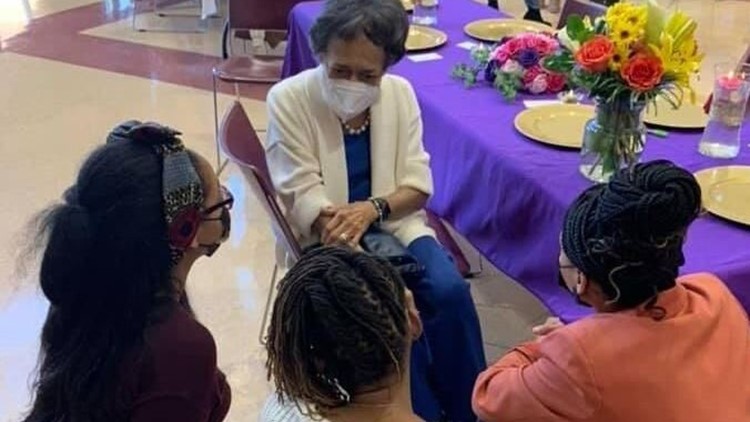Drs. Jade James-Halbert, Carolyn Pryor, and Ebonee Carter at Cardinal Ritter College Prep hosted the brunch.
The doctors came from every major health system, community health centers, insurance companies, private practice, and academic institutions from St. Louis and the Metro East.
“It was such an honor to be a part of this inaugural event to bring Black female physicians in the Metro St. Louis area together,” Pryor said. “There was so much excitement and energy in the room. It’s important for us as Black female physicians to network and support each other not only in our professional lives but in our personal lives. We need to make sure that we remain strong so that we can help the next generation of black girls who aspire to become doctors.”
The doctors represented specialties including cardiology, family medicine, internal medicine, maternal-fetal medicine, Ob/GYN, pediatrics, urology, breast surgery, psychiatry, podiatry, endocrinology, and sports medicines.
Retired pediatrician and St. Louis medical trailblazer Dr. Mary Tillman, 86, received a standing ovation when she entered the room. She was later presented with a bouquet of flowers by James-Halbert and Pryor.
“We love our community,” Dr. Kanika Cunningham, a family medicine physician, said.“It was such an honor to finally meet a St. Louis pioneer for Black women physicians, Dr. Mary Tillman. (She) started this journey in the 1960s. It’s because of her, Dr. Nash, and a few others that so many of us stand strong today and continue to provide exceptional care no matter where we work. We love our community.”
The event highlighted the breadth of talent located in St. Louis. Many of the attendees were meeting colleagues for the first time.
“I’m so glad we did this. We needed it,” James-Halbert, said.
Dr. Denise Hooks-Anderson, M.D., FAAFP, associate professor, SLUCare Family Medicine and St. Louis American medical editor, called her fellow Black doctors “amazing.”
“The COVID-19 pandemic has been extremely exhausting for healthcare workers, particularly physicians of color,” Hooks-Anderson said. “In addition to our daytime duties, many of us are putting in extra hours to educate our communities and families. So, being able to let our hair down and share a meal with our sister doctors was such a treat. My heart was so full of joy, and my soul was at peace.”
Dr. Carter said it’s easy to feel depleted when Black people suffer disproportionately high rates of premature death and disease.
“We work in healthcare systems where our friends, family, and patients are scared to seek care because the U.S. medical system is fraught with racism and injustices,” she said. “My heart was filled with fellowship, sisterhood, and support by my Mocha doc sisters, and it felt like we all really needed it.”


